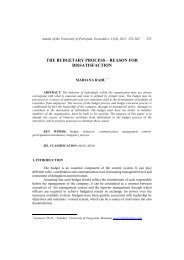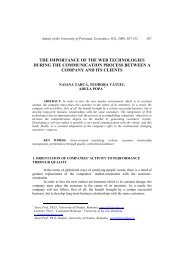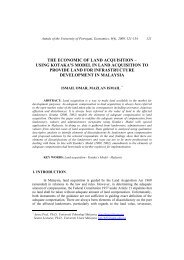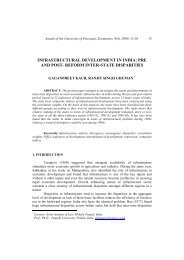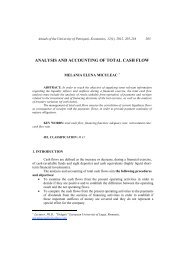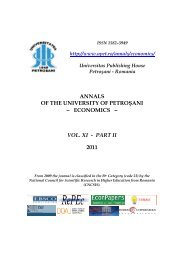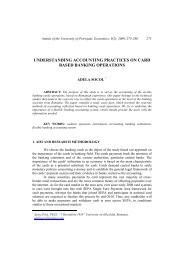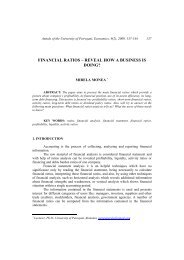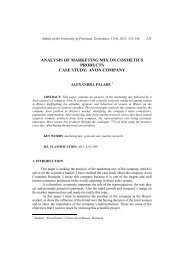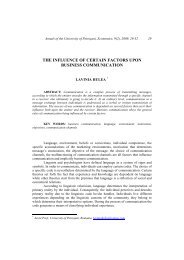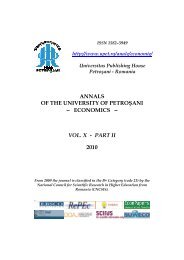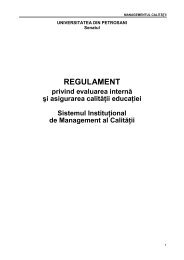annals of the university of petroÅani â¼ economics â¼ vol. xi - part i ...
annals of the university of petroÅani â¼ economics â¼ vol. xi - part i ...
annals of the university of petroÅani â¼ economics â¼ vol. xi - part i ...
You also want an ePaper? Increase the reach of your titles
YUMPU automatically turns print PDFs into web optimized ePapers that Google loves.
278 Vătavu, S.; Pirtea, M.; Vătavu, S.<br />
The aim <strong>of</strong> this paper is to find regulations to avoid future nationalisation <strong>of</strong><br />
losses during crises. Such regulations and limitations depend on bank deficiencies and<br />
include factors such as capital, risk, liberalisation or transparency.<br />
2. BANK PERFORMANCE AND PROFIT SHARING<br />
Entrepreneurs performance represents <strong>the</strong> driving factor behind investment<br />
banking, and <strong>the</strong>y share <strong>the</strong> pr<strong>of</strong>its, but not <strong>the</strong> losses. Bankers save bonuses while<br />
losses accumulate, inducing a financial crisis for whom nobody can be held<br />
responsible. Unfortunately, <strong>the</strong> claim back resolution is not a recovery solution (Taleb,<br />
2009).<br />
Smith and Watts (1992) argued that incentive compensation is practiced more<br />
in organisations with continuous development, and that growth is expected in banking<br />
firms more than in non-financial companies. On one hand, compensation does not<br />
depend on firm performance in restricted and controlled systems. On <strong>the</strong> o<strong>the</strong>r hand, in<br />
unrestrained industries, compensation is overburdened, and it is kept secret through<br />
management discretion.<br />
Hubbard and Palia (1995) summarized <strong>the</strong> payment structure dependent on <strong>the</strong><br />
economic environment. Organisation should have a well established regulation system<br />
with remuneration based on performance. When a bank deals with low level <strong>of</strong> risk,<br />
pay figures are lower as well. However, when <strong>the</strong> environment has a high level <strong>of</strong> risk,<br />
remuneration is higher. Therefore, managers prefer to keep safe contracts and low<br />
sensitivity between performance and risk. The shareholders’ interests need to support<br />
managerial bonuses, because when executive <strong>of</strong>ficers are not satisfied with <strong>the</strong>ir<br />
payments, <strong>the</strong> effectiveness may decrease. The equilibrium can be found when <strong>the</strong><br />
shareholders ma<strong>xi</strong>mize <strong>the</strong>ir wealth, while managers are fully protected from risky<br />
actions.<br />
Remuneration system and shareholders’ large amount <strong>of</strong> bonuses have been<br />
<strong>the</strong> main problems related to banks for a long time. During financial crisis, although<br />
banks registered increasing losses on <strong>the</strong>ir balance sheets, managers wanted to raise <strong>the</strong><br />
bonus pools. For example, at <strong>the</strong> beginning <strong>of</strong> 2008, Morgan Stanley declared $9.4<br />
billions losses for <strong>the</strong> last quarter, but increased its bonuses with 18% for <strong>the</strong> reason<br />
that employees should not suffer from <strong>the</strong> subprime market mistakes. It was discovered<br />
that managers had shared bonuses incorrectly, and <strong>the</strong> previous years amount was<br />
higher than <strong>the</strong> limit. Unless <strong>the</strong> explanations were plausible, <strong>the</strong> firm had to return <strong>the</strong><br />
supplementary money and reconsider <strong>the</strong> bonus pool. Therefore, <strong>the</strong> compensation<br />
practices may deepen <strong>the</strong> financial crisis (Rajan, 2008).<br />
John Thain, <strong>the</strong> former chief executive <strong>of</strong> Merrill Lynch, described bonuses as<br />
a “reward talent” and a key element for market liberalisation, but not a way to enrich<br />
bankers while <strong>the</strong>ir bank fails (Taleb, 2009). Besides <strong>the</strong> basic role <strong>of</strong> achievements<br />
reward, bonuses are supplemental revenues for managerial positions, and this second<br />
use is rapidly expanding. Also used for motivation, bonuses are claimed to be a<br />
fundamental incentive system.<br />
Liang (1989) studied pr<strong>of</strong>its and <strong>the</strong>ir connection with market concentration<br />
and risks. Empirical studies demonstrated a close link between risk and pr<strong>of</strong>its. Higher



